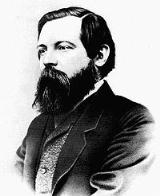
Friedrich Engels
Overview
Germans
The Germans are a Germanic ethnic group native to Central Europe. The English term Germans has referred to the German-speaking population of the Holy Roman Empire since the Late Middle Ages....
industrialist, social scientist, author
Author
An author is broadly defined as "the person who originates or gives existence to anything" and that authorship determines responsibility for what is created. Narrowly defined, an author is the originator of any written work.-Legal significance:...
, political theorist, philosopher
Philosophy
Philosophy is the study of general and fundamental problems, such as those connected with existence, knowledge, values, reason, mind, and language. Philosophy is distinguished from other ways of addressing such problems by its critical, generally systematic approach and its reliance on rational...
, and father of Marxist theory
Marxism
Marxism is an economic and sociopolitical worldview and method of socioeconomic inquiry that centers upon a materialist interpretation of history, a dialectical view of social change, and an analysis and critique of the development of capitalism. Marxism was pioneered in the early to mid 19th...
, alongside Karl Marx
Karl Marx
Karl Heinrich Marx was a German philosopher, economist, sociologist, historian, journalist, and revolutionary socialist. His ideas played a significant role in the development of social science and the socialist political movement...
. In 1845 he published The Condition of the Working Class in England
The Condition of the Working Class in England in 1844
The Condition of the Working Class in England in 1844 is one of the best-known works of Friedrich Engels.Originally written in German as Die Lage der arbeitenden Klasse in England, it is a study of the working class in Victorian England. It was also Engels' first book, written during his stay in...
, based on personal observations and research. In 1848 he produced with Marx The Communist Manifesto
The Communist Manifesto
The Communist Manifesto, originally titled Manifesto of the Communist Party is a short 1848 publication written by the German Marxist political theorists Karl Marx and Friedrich Engels. It has since been recognized as one of the world's most influential political manuscripts. Commissioned by the...
and later he supported Marx financially to do research and write Das Kapital
Das Kapital
Das Kapital, Kritik der politischen Ökonomie , by Karl Marx, is a critical analysis of capitalism as political economy, meant to reveal the economic laws of the capitalist mode of production, and how it was the precursor of the socialist mode of production.- Themes :In Capital: Critique of...
. After Marx's death Engels edited the second and third volumes.
Quotations
Hegel was the first to state correctly the relation between freedom and necessity. To him, freedom is the insight into necessity.![]()
Anti-Dühring, pt. 1, ch. 11 (1878)
The state is not “abolished,” it withers away.![]()
Anti-Dühring, pt. 3, ch. 2 (1878)

